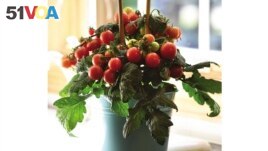Gardeners, or people who grow plants and crops, typically use a part of land on their property. But for many people having a bit of land is just a dream. Some people have limited ability to move around. Others might be scared because they are new to gardening.
There is a solution to these barriers. Jessica Damiano is an expert and educator in all things gardening. She invites people to start with small gardens. Even for people with a lot of land, if they start with small container gardening, they can avoid weeds and just care for a few plants.
Many people who produce plants have decreased the size of plants we eat for food. That is because of the gardening renaissance. People are gardening on the tops of their homes, in fire escapes and on small outdoor areas for sitting. These places are best for planting vegetables in containers.

This image provided by Ball Horticultural Company shows a Kitchen Mini Red Velvet tomato plant, which is suitable for growing in containers. (Ball Horticultural Company via AP)
Damiano suggests looking for small varieties of your favorite vegetable. Even though they are small, the plants will produce a lot! Crops that have the words little, mini and baby, like Patio Baby eggplants, Sugar Baby watermelons or Kitchen Minis tomatoes, will be perfect for small containers. Plants that grow towards the sky, and most herbs, also grow well in pots.
After you select the type of crop you want to grow, you must consider the container, the type of soil or potting mix and where your plants will grow. This is an important step.
Unlike plants that are grown in the ground, plants grown in containers need more water and fertilizer. Use deep pots made of metal or plastic to hold in the water. This can decrease the amount you have to water the plants. Be sure the containers have holes in the bottom to drain the water.
Dirt from your land is too heavy and may house disease or insects. Instead, you can choose excellent, organic potting mix that does not have soil mixed in. You should also mix in organic fertilizer that can be used with water if the mixture does not include it. Keep using the fertilizer every week to 10 days throughout the time you grow. After planting, use mulch on top of the potting mix to decrease evaporation, keep the soil temperature even, and prevent weeds from growing.
Most plants that grow food need at least 6 hours of sunlight a day, but if you have an area with little sunlight, try growing a plant that prefers less sun, like carrots, greens, or beets.
Depending on what you are growing, use different size pots. Small varieties of plants do well in anything from 2 gallons to 5 gallons depending on the size of the plant. Cucumbers and peas require 2-gallon containers. Small carrots and peppers need 5-gallon pots. Larger plants like watermelons need 8-to-10 gallons. For potatoes, you can use a plastic liner with holes and small rocks in the bottom for water to drain.
Herbs do not need extra fertilizer throughout the growing season, but they do need the smallest size container, no less than a half-gallon.
The best way to check for water in the soil is by pushing your finger about 2 inches into the soil and if the soil feels dry by the roots of the plant, add water. Watering the plants less often, but more intensely at one time is better than watering a little bit every day.
With these ideas, a little planning, and the correct plants, your small space can grow a lot of crops!
I’m Faith Pirlo
Jessica Damiano reported this story for the Associated Press. Faith Pirlo adapted it for VOA Learning English.
__________________________________________________________________
Words in This Story
weeds – n. unwanted plants or flowers surrounding the main plant
renaissance – n. a rebirth or renewal of something
fertilizer – n. a substance that is added to plants to help them grow
organic – adj. produced or treated without chemicals
mulch – n. natural materials that is used for covering plants
What vegetables would you grow in a small container? We want to hear from you. Write to us in the Comments Section.
